Have you experiencing the telltale signs of throttling?
- Videos the re-buffer or stream in lower resolution
- Excessive lag while gaming
- Slow file downloads (especially on p2p networks).
And if you’re here, you already suspect that something fishy is going on. You’re concerned that you’re not getting 100% of the speed you’re paying for.
And you might be right.
Because data throttling is increasingly common, but widely misunderstood. So I’m here to set the record straight… and teach you how to fix it.
In this guide, you’ll learn:
- What throttling is (and what it isn’t)
- Why ISP’s and mobile carriers throttle traffic
- Which Internet Providers use throttling?
- What type of data gets throttled
- How to tell if you’re being throttled
- How to detect, prevent & bypass internet throttling
Throttling 101
What is throttling?
Bandwidth throttling (also known as traffic-shaping) is the technique of limiting internet speeds at certain times of day, or for specific websites, services, and data types (such as video).
Throttling most often affects high-bandwidth activities like: video streaming, gaming, and file-sharing (especially p2p networks like BitTorrent).
How Throttling Works
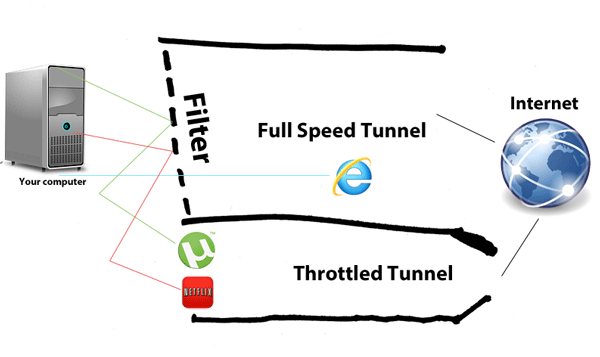
When throttling traffic, an ISP will filter internet traffic, and divide it into two buckets. Here’s a typical scenario:
- Fast Lane: This is the unthrottled bucket which contains things like: web-browsing, social media, Google.
- Slow Lane: Throttled traffic might include: Youtube videos, Cord-cutting video packages, Hulu, Netflix, and BitTorrent.
Why do ISP’s Throttle your Data?
Internet Service Providers (ISPs) engage in bandwidth data throttling to save money.
By limiting speeds for certain users or websites, your ISP can reduce the data usage on their entire network. This allows them to serve more customers without increasing their network capacity (increasing their profit margin)?
Is it fair? Not really.
Is it legal? In the USA, throttling is legal now (thanks to the repeal of Net Neutrality in 2017).
Different Types of Throttling
Not all bandwidth-shaping is the same.
Some ISP’s restrict bandwidth at certain times of day (like peak hours after work).
Others cap your data after a certain daily or monthly quota.
Those first 2 types (while common) are often obvious and usually written into your subscriber agreement.
But the more insidious traffic-shaping techniques are those that slow specific web services and protocols, making your experience worse without reducing your overall internet speed. And this type is harder to detect (and prove) which is why several broadband providers have (mostly) gotten away with it for years.
Commonly Throttled Websites & Traffic Types
- HD Video: Netflix, YouTube, Hulu, Twitch
- Gaming: WoW, League of Legends, Fortnite
- File-sharing: BitTorrent, Usenet, RDP
Affected Operating Systems
Bandwidth shaping can affect any OS or device manufacturer, including Apple, Windows/PC, iOS and Android. Mobile data is more likely to be throttled, due to the bandwidth constraints of mobile networks.
How to Detect Throttling
Traffic-shaping technology is incredibly advanced. It took years to learn that Comcast was using Sandvine ‘congestion management’ software. And many other ISP’s have denied using similar techniques precisely because it’s so hard to prove (and there’s hardly any penalty for getting caught).
Why a speedtest isn’t enough
Detecting throttling isn’t as easy as running an internet speedtest.
Why?
Because most throttling occurs at the protocol level. They could restrict your video streams to a lower resolution, while your overall bandwidth maximum doesn’t change. Of course, it’s very hard to reach your maximum bandwidth if all the high-bandwidth uses are throttled individually.
Tools to detect Throttling
There are a couple free online tools that are designed to detect bandwidth manipulation by your internet provider. Our all-time favorite was the Glasnost project, but it has (sadly) been discontinued.
The best alternative to Glasnost is The Internet Health Test.
1. Internet Health Test
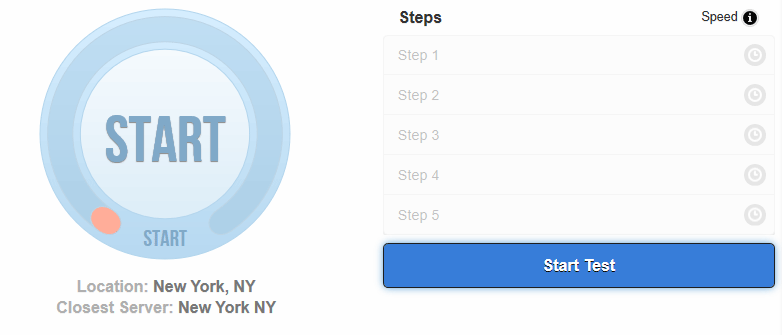
The internet health test is a free web-app developed by FightForTheFuture. While it can’t measure specific protocols like video, p2p, etc, it checks your performance across the largest backbone networks (where services like Netflix and YouTube host their data) to see if there are any obvious bottlenecks.
Understanding the results:
Here are the results when I tested my internet connection (Verizon Fios):
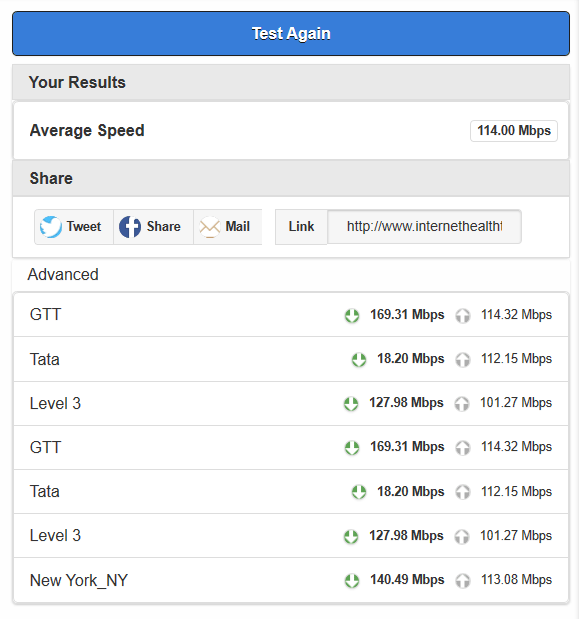
As you can see, there is a small but consistent slow-down for Level 3-hosted services. But the picture gets much worse when connecting to Tata, with a near 90% reduction in speeds (and evidence of probable throttling).
While some slight speed drop-off is expected due to distance and packet-loss, anything over 25% is quite suspicious.
2. The Youtube Test (Manual)
The Youtube Throttling Test is an unscientific (but easy) way to quickly tell if your ISP is limiting your video bandwidth.
How to perform the test:
- Open a 4k video like this one
- Make sure you select 4k resolution from the settings cog
- Play the video at full screen resolution and see if it buffers more than once
- If it does buffer, drop the resolution and retry.
- Repeat until you reach the resolution that doesn’t require buffering. This is your effective video bandwidth.
Then check your resolution against the following chart of YouTube bitrates to get an estimate of your video bandwidth.
Understanding the Results:
You should compare your video bit-rate against your overall internet speed as tested by a site like SpeedOfMe.
If your video bandwidth is significantly lower than your tested internet speed?
That’s evidence of possible throttling.
Next up, I’ll show you how to do something about it.
The best way to STOP Throttling: Use a VPN
As you already learned, throttling requires separating traffic into different buckets, and limiting speeds for some traffic.
Legally, your ISP can’t slow all your traffic if you’re paying for a specific internet speed (100Mbps for example).
So to block throttling, all you have to do is prevent your ISP from viewing and separating your traffic.
And to do this, we’ll use a Virtual Private Network (VPN).
In simple terms, a VPN wraps all internet traffic (to and from your device) in an unbreakable layer of encryption.
This accomplishes 2 things:
- Prevents your ISP from seeing what services, websites and protocols you’re using.
- Stops your ISP from separating your traffic (because 100% of your traffic is encrypted and routed to the remote VPN server).
Using a VPN for Throttling
Not only is a VPN the best, most effective tool for the job; it’s also 1-click easy-to-use. And you’ll know pretty much immediately whether it will work to speed up your video streams and p2p downloads.
Previously, when I was a Spectrum (Time Warner Cable) subscriber, Youtube was heavily throttled. By connecting to a VPN, I was able to go from 720p resolution to 4k instantly.
The Best VPNs to block Throttling
There are the VPNs I recommend highest to circumvent throttling. I prioritized providers with the fastest server speeds (4k-capable) and strong encryption.
Good (Fast) VPNs to try:
How to use the VPN to bypass throttling
Blocking throttling with a VPN is dead simple.
- Sign up for a VPN
- Download the VPN software on your device(s)
- Sign in with your username/password
- Choose a server location (usually nearby) and click ‘Connect’
- That’s it! Your connection is encrypted, and throttling should be bypassed
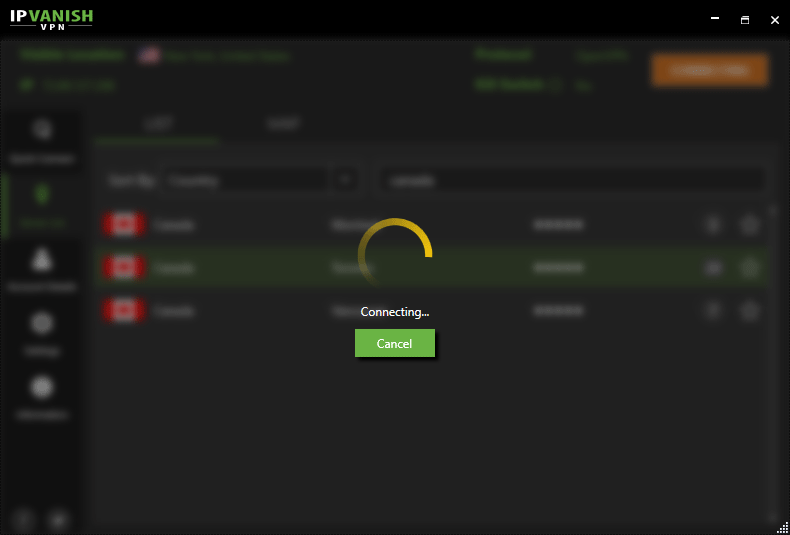
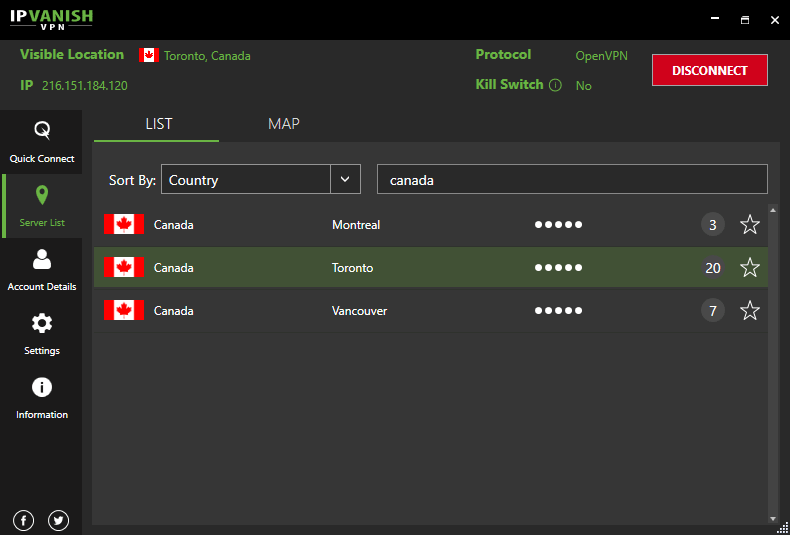
Summary & Additional Tips
Throttling is (increasingly) widespread in the U.S. and abroad. It affects all internet-connected devices, and especially mobile devices.
You’ll most often notice evidence of throttling while:
- Watching HD video
- Gaming
- Torrenting
How to fix it:
The most effective (and easiest) solution is to use a high quality, fast VPN service like IPVanish.
Will it work?
In most cases, a VPN will help you stream video at higher resolutions (without buffering) and download torrents and share/download files at high speeds. It can even get around video-resolution limits on unlimited data plans.
Cases where you can’t fix throttling:
If your ISP thottles all traffic at certain times of day, or caps your speeds after a certain amount of data usage, then a VPN (nor any other tool) can save you. For more info, read our guide to circumventing data caps.

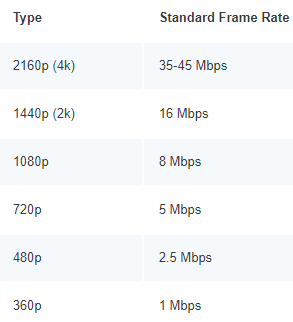
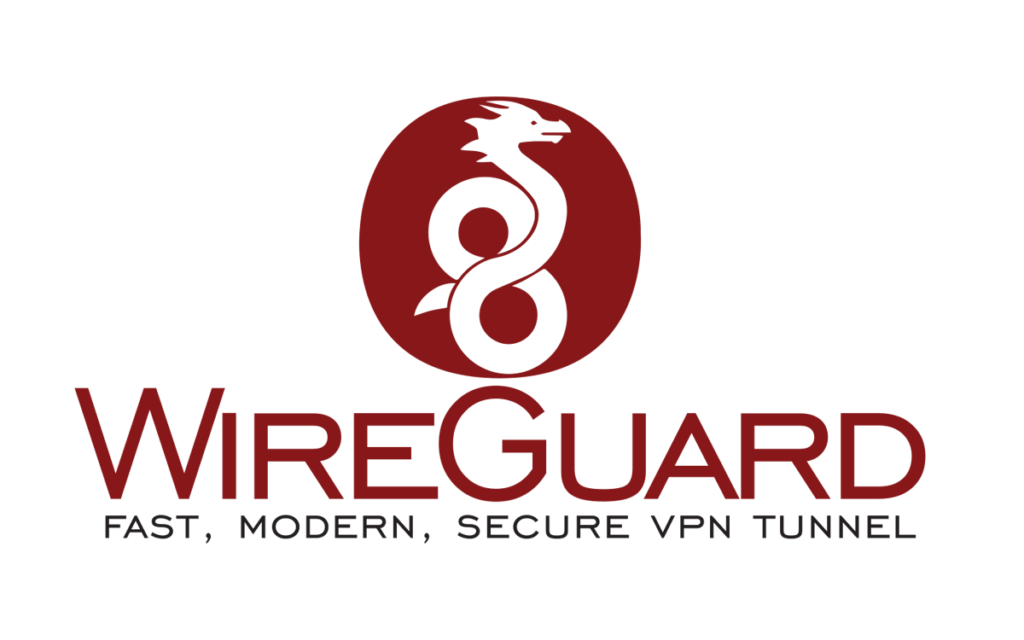
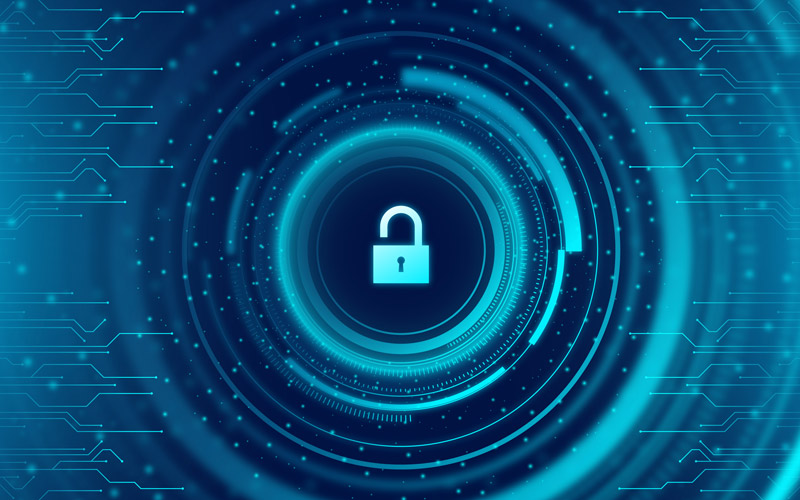
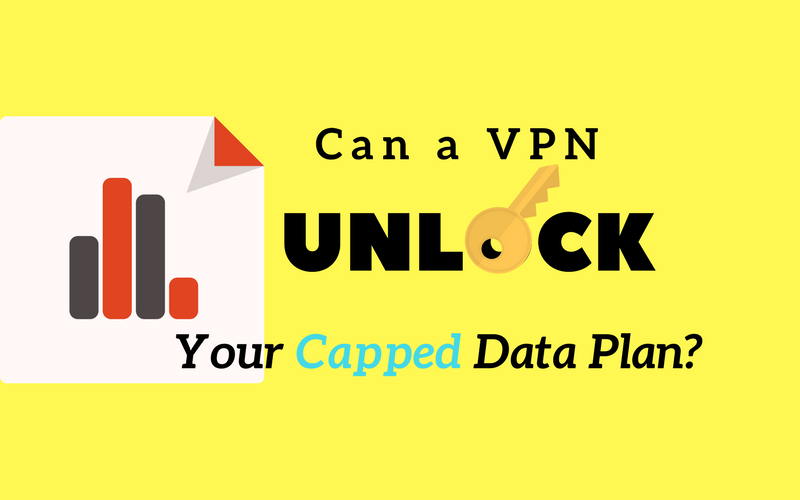

I was able to find VPN services best for the Country I live in that supports why I need a VPN. Thank you…
Thank you!! This was very helpful.
I do not have any sort of ISP I only have the hotspot on my T-Mobile unlimited hotspot data plan. I know for a fact that they throttle me because since I use my hotspot for everything because I don’t have Wi-Fi or an ISP I use it for all of my devices which include two smart TVs an iPad and a windows 10 laptop and have confirmed in many conversations with T-Mobile Support that I usually wind up getting throttled back by most commonly the second day of my billing cycle. Are there any options that can help me? Additionally more and more people are doing away with having expensive cable and ISP accounts because more and more networks are offering their own subscription plans for the very same reason. Are there any options that can help me? Additionally more and more people are doing away with having expensive cable and ISP accounts because Moore and Moore networks are offering their own stand alone subscriptions for this very same reason. All information that you might be able to provide would be appreciated.
Unfortunately, most mobile carriers throttle 100% of your data pipe when the network is ‘congested’. This can’t be fixed with a VPN. If, however, they are only slowing specific sites like Netflix/Youtube, then you may get faster overall speeds by using a VPN. It’s worth a shot.
I have come to find out after purchasing Nord VPN
Spectrum has been throttling my bandwith HARDCORE
Before VPN
Pay for 200mbs a month-received about 30-40mbs
Video stuttering, gaming lag, slow downloads
After VPN
200mbs for everything
no buffering
no game lag
30 gig download in minutes not an hour
THANK YOU SO MUCH :}
I pay for a 100mbs plan with my ISP. The strange thing is they only throttle the connection to one laptop (which is the heaviest user by far) to an average of 8 mbs. I’ve taken the laptop to other houses and connected to their wifi and the speed will be at a normal rate meaning there is no issue with the laptop itself. I’ve plugged in an Ethernet cable to two laptops side by side with showing 90mbs and mine 8mbs. Is this something ISP’s are able to do? Identify one computer on the network and only throttle them.
I’ve never heard of this happening. Are you using a router provided by your ISP? In case, they can see the MAC address of your device and throttle it if they choose. That should be illegal however (which doesn’t mean it isn’t happening).
What ISP do you use?
Why am I getting throttled playing xbox live only,
ISP’s throttle specific types of traffic. It could also have to do with the gaming server you’re connected to or even be a DDOS attack in theory.
My Internet provider, Suddenlink, started throttling my Internet AFTER I started using IPVanish on my PC, usually by about 60 percent and sometimes by more that 90 percent. Is that legal?
Unfortunately throttling is now completely legal in the USA (if that’s where you are). Congress repealed net-neutrality protections after the 2016 election.
that’s dumb throttling is bull crap
I agree. Throttling is theft, especially considering how expensive broadband internet is.
I have a small wifi device about the size of a pack of cigarettes. That I pay $60 a month for. It’s truly unlimited hotspot. No throttling ever , never slows down no matter how many devices I have streaming , gaming etc
Can take anywhere with me. Have 8 people in my house, streaming and gaming non stop all month. Has never slowed down. Have had for over a year now with no problems
This sounds great, what’s it called? Do you stick a SIM card directly in the device, or it connects to your phone?
I had two if those “un throttled” account with different companies, and the carriers are cracking down on them for violation of use. I had one cancelled after a month as the company was shut down by the carrier and the other lasted 3 months and they too were shut down. Many of these people selling unthrottled plans are doing it against the carriers policies reselling business accounts that they purchased in bulk and eventually get shut down. That is why many of them tell you now if you hit 1 tb of usage they will cancel you policy, some even less.
Can you share the name of this device?
We currently live in a rural area in which we use a router for our internet (through our Verizon cellular service) Is there any way of using VPN with the router or do we need to download on specific devices? Thanks
It’s possible, but you’d need a second router as described in our dual-router VPN tutoriala.
I’m having the opposite occur. My speeds are great without my VPN but the throttling is killing me while on the VPN.
That either means your VPN provider is very slow (common with free or discount VPNs) or perhaps your ISP throttles VPN data?
I have believed for the past couple years my isp is throttling devices connected to a VPN I use express vpn and find I get great speeds on other networks do you think a router with built in vpn would help my situation
It’s certainly possible, but before spending $150 on a high-end router, you can just test your theory with VPN software on your device and see if it fixes the throttling issue. Also be aware that 2nd-tier VPN routers max out between 25mbps and 45mpbs while using VPN. To get higher speeds than that you’re probably looking at $200+ for a router.
Salute to you mate. And I mean it. I felt something is happening when I start watching youtube videos on 1080p. I searched about it and found nothing. Then I found your website. Thanks again mate. You saved me a lot of time.
Happy to help! Yeah I was shocked the first time I discovered this. ISP’s have lots of dirty tricks to cut bandwidth usage.
This sounds like an arms race will begin, with everyone eventually having to get a VPN to avoid throttling, because even more bandwidth will be taken up by gamers etc who are dodging the throttling of their connection and the system will be overloaded.
Yeah, we’re already heading in that direction with almost every Antivirus company upselling VPN service. Still, mainstream VPN usage is a fraction of the population, and next-gen network technology will probably increase ISP’s speed capacity further. Fios Gigabit is pretty widespread in my area, though most people are using a fraction of that capacity.
I have IPVanish however when I try to watch netflix I get an error code that I need to log off the VPN in order to be able to watch netflix. is there a fix for this?
If you contact IPVanish support they may be able to direct you to a server that works with Netflix. Unfortunately Netflix goes to great lengths to block most VPN services. A few, like NordVPN, Cyberghost and VyprVPN still work.
A bit late to the party but I wanted to get complete on why people in IPTV forums tend to suggest that one switches off their VPN if one is experiencing buffering and or stuttering…
If you’re running a VPN on underpowered harware (like a Firestick) it may slow your connection to the point that it can’t handle 1080p streams. If you need the VPN for privacy reasons, consider using a VPN router and a faster VPN service.
I am confused. What is the difference between VPN for throttling vs VPN for PC usage? I hope am asking that question correctly. Because I use a VPN with my antivirus. Any help would be so greatly appreciated.
As long as your Antivirus’ VPN encrypts all your traffic, it should help with throttling. Of course your speeds will be limited by the speed of your VPN, and in our experience Antivirus-owned VPN speeds are mediocre.
Is it possible to group all devices on my network (I.e. PC,Console,smartphones) to utilize a VPN or is it PC only?
It’s definitely possible, but you need a vpn-enabled router. In my opinion, the easiest way to do this is with an ASUS-WRT router that has built-in VPN support. We recommend the AC-68U as a good entry-level VPN router.
We have two setup guides for how to install the VPN on your router:
I was going to ask about how to avoid throttling on smart TV’s–we have two that are Rokus–since I assume, perhaps wrongly, that I can’t install any software on the TV’s myself. But it seems the question above about grouping all devices on a network to utilize a single VPN would pertain to my issue. Recently I’ve experienced serious throttling while watching streaming services, sometimes to the point that they will stop. My smartphone has been very slow as well, even while just using the internet to browse. Would a VPN enabled router be a good choice for me? I’m on Cox Cable in La. The last time I did a speed test, I was only getting 25-45 Mbps and we’re paying for 150 Mbps. Cox told me my modem was not the latest model or something to that effect. I haven’t changed it yet because I wasn’t convinced. (They want me to rent their modem, which I won’t do.) I’m also wondering if anything at all will help since many children are doing school online and many parents are working at home due to the pandemic.
I would try to rule out other issues before investing in a VPN router (which will cost more up front than renting the new modem from Cox). Try to eliminate wifi interference and make sure your rokus are getting strong signal. Try plugging one in via ethernet temporarily to see if it makes a significant difference.
If you’re still having issues even under ideal conditions, then yeah a VPN router should work for you.
I have notice recently my torrent downloads barely moves. I subscribe to a midnight data plan so than I can download whatever i want and go back to sleep expecting the downloads to complete by sunrise. It initally worked great with speeds of around 3mb/s. I am in Africa and so I’m more than okay. Recently, my speeds haved dropped for the bittorrent downloads to barely 100kpbs.
How do I bypass this? Normal downloads are very faster and I am more than sure they are throttling speeds for bittorent users.
Please help. I have about 50gb of files sitting on my phone without able to download them as the speeds are very slow. Thank you mate in advance.
BitTorrent is one of the most-throttled protocols.
If you’re torreting on your phone, first changing the power settings of your torrent app to make sure it doesn’t sleep over night. We have instructions in our Flud tutorial.
If that doesn’t work, then it’s probably throttling. A VPN should fix things. I recommend Private Internet Access.
I use GotW3
They are now throttling will a VPN help?
A VPN usually fixes throttling, but not always. For example, some aggressive ISPs will also try to throttle VPN traffic. It really depends on what country you’re in. You can try a free VPN like Windscribe and see if it helps before buying a more premium service.
Thank you so much for this article. I am not tech savvy and I have never heard of throttling. I like most of America hate cable. My question is, if I do not have a 4k tv, I’m not a gamer but have been experiencing slow internet searching and my VPN through work at home stopped connecting this week, should I bother with the VPN or look into a plug in wifi device if I drop my cable? Here is what I have: personal laptop and my work laptop in my apt. I also have a roku device.They are telling me ( comcast) they need to replace wiring in my apt to get my internet connection consistent. I am strongly considering dropping cable and going with just internet and use my roku, just very nervous. I just want to be sure my work VPN Any suggestions? Thank you again for educating the public on this matter. I will share this with as many as I can.
Hi Renee,
It sounds like you have wifi and/or internet issues that need to be resolved first. It’s not clear that throttling is the problem. I’d let Comcast see if they can fix your issues.
It could easily be an old or underpowered wifi router as well. To rule that out, try plugging your device directly into your router or modem and see if your issues go away.
Good luck!
Hi, i currently use ip vanish as my go to VPN. But how would one get around game companies such as Origin, Uplay and Steam when they throttle downloads to insanely slow speeds?
Thanks!
First, I would connect your computer directly to your router via ethernet to rule out networking issues. Also, try disabling your firewall/antivirus temporarily. If speeds are still slow and a VPN doesn’t fix it then it could simply be a congestion issue on the Origin/Steam’s servers.
Working in Ontario, Canada on a ‘line of sight’ wireless internet connection. Will a VPN work up here as well?
If your internet is REALLY slow, then a VPN probably won’t be useful. I’d say you’d need a minimum speed of 3-5mbps to be viable.
Hi I have express vpn but it’s not helping. What protocol should I try to use on vpn? I get packet loss during peak hours like evenings. Contacted tech support as well but they weren’t able to find any issue.
It sounds like your ISP throttles all traffic at peak hours. Unfortunately a VPN won’t help in this case and might cause even slower speeds. Your only real option is to switch internet providers or upgrade your plan.
The bigger issue is the wording in your contracts with providers. They ALL use the term “as fast as xxx mbps” or “up to xxx mbps”.
The problem is that this leaves a .1 mbps acceptable condition as there is NO stated minimum.
I suggest that people need to begin to contact their state and federal legislators and demand that when an IP states a connection speed that they must be able to deliver not less than 88% of that bandwidth at any time and must deliver the full bandwidth more than 99% of the time. Such legislation should also require that the provider not be able to choose which portions of band width are affected by reduced bandwidth.
This would effectively end throttling and require engineering to meet sales requirements. This is also a “fix” that avoids any net neutrality issue because it then becomes a contract issue. If I am using less than 99% of my contracted band width, then it would be effectively unlawful to throttle my streaming or gaming or specific political content more than a few percent.
I can remember when dial-ups started and the leader sold so many lines they could not support any of them. They congested the net so badly that nearly all the clients spent more time on the phone with them than online. Most left them permanently (hint) and though they exist in theory today they are only a memory.
Hey, the health test only has one step and just checks speed. This doesn’t tell me much.
Unfortunately it looks like the Internet Health Test may have been bought out by Ookla, and much of its former functionality removed.